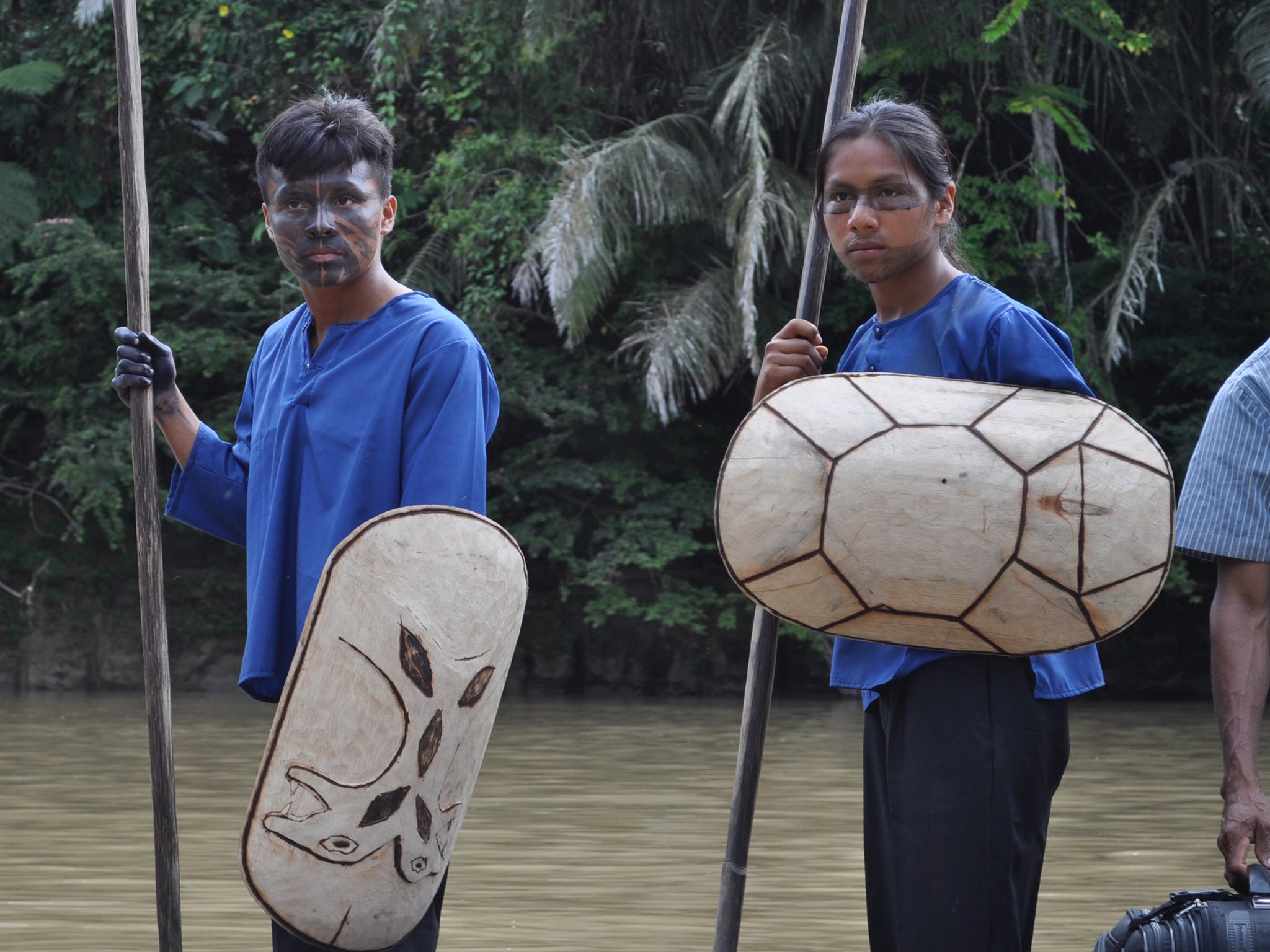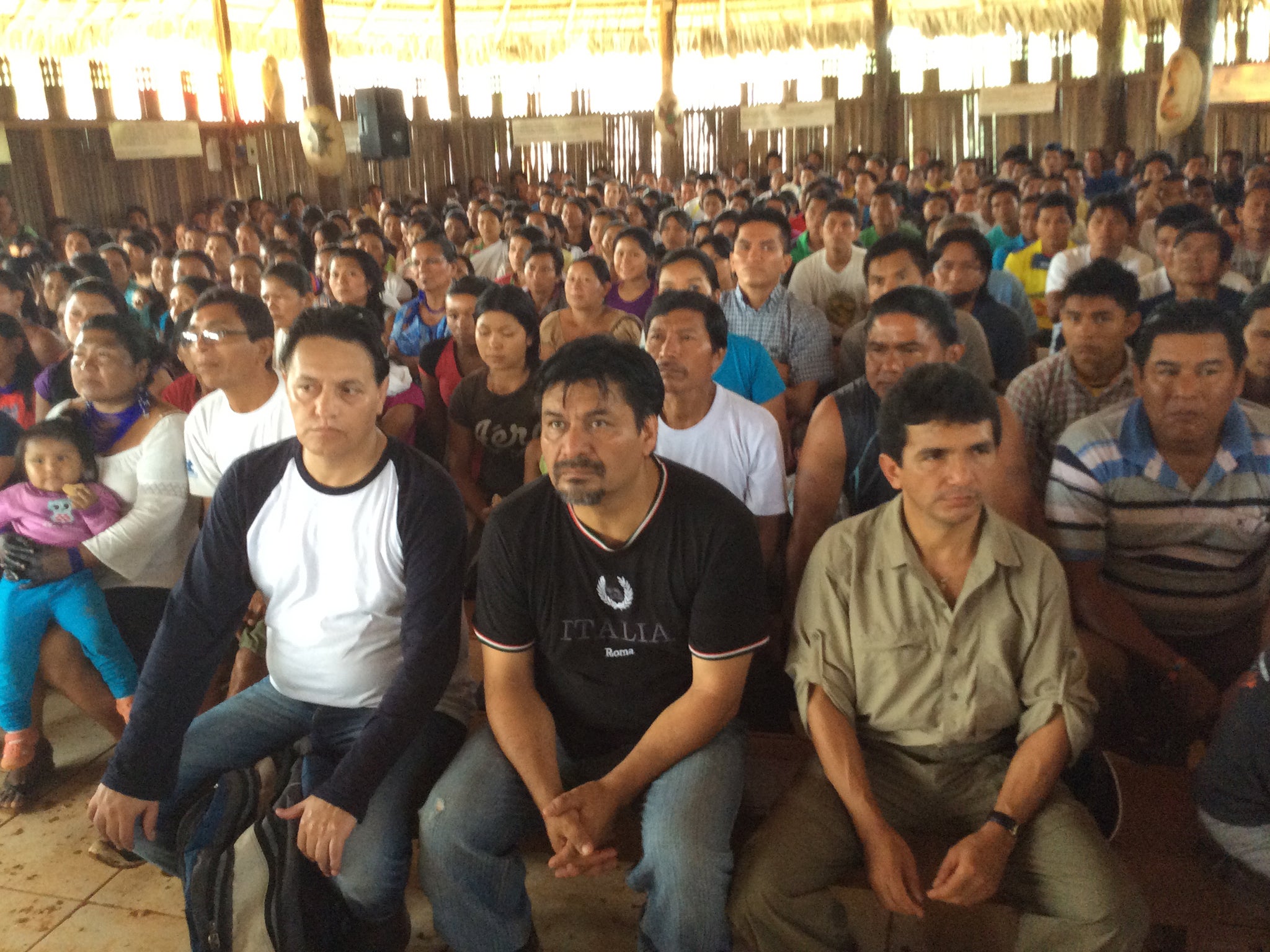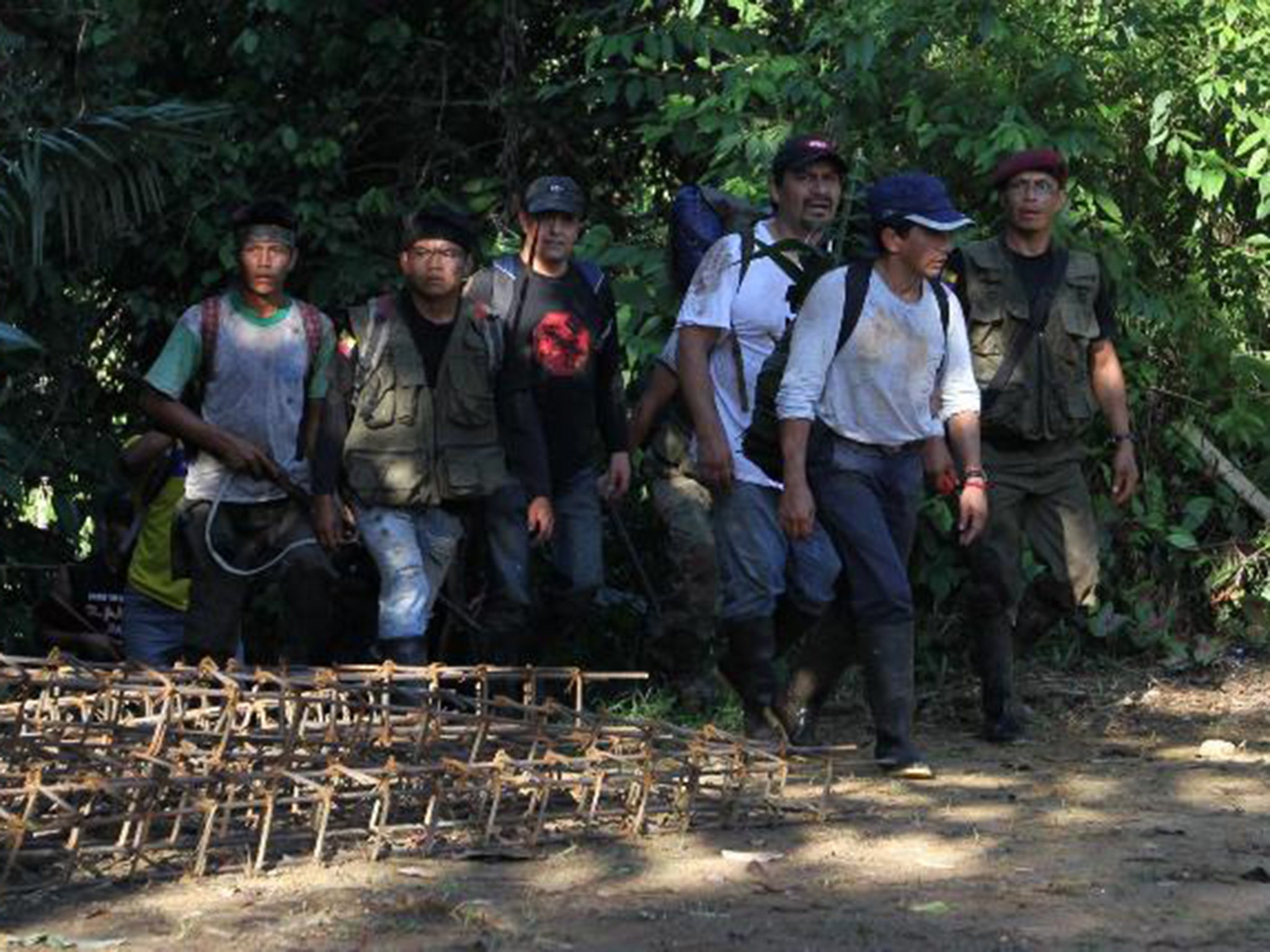World Press Freedom Day: The journalist forced into hiding for resisting Ecuador's authoritarian government
Media censorship is on the rise in the country that harbours Julian Assange

Your support helps us to tell the story
From reproductive rights to climate change to Big Tech, The Independent is on the ground when the story is developing. Whether it's investigating the financials of Elon Musk's pro-Trump PAC or producing our latest documentary, 'The A Word', which shines a light on the American women fighting for reproductive rights, we know how important it is to parse out the facts from the messaging.
At such a critical moment in US history, we need reporters on the ground. Your donation allows us to keep sending journalists to speak to both sides of the story.
The Independent is trusted by Americans across the entire political spectrum. And unlike many other quality news outlets, we choose not to lock Americans out of our reporting and analysis with paywalls. We believe quality journalism should be available to everyone, paid for by those who can afford it.
Your support makes all the difference.Two police helicopters hover over the Amazonian rainforest. They descend slowly and stir the Sarayaku tribe into action. Men spread across the territory to block off potential landing zones. Women and children rush to their homes and return with makeshift weapons fashioned out of household utensils. Whenever the helicopters try to land, the women and children move in unison to ward them off. Liquid tobacco snarls out of their nostrils as they swallow up the ground beneath the helicopters.
The pilots persist, but their task proves impossible. Sent by the Ecuadorian government, they are here to make the arrest of Clever Jiménez, Carlos Figueroa and Fernando Villavicencio. The three political exiles are accused of slander against President Rafael Correa. Fourteen police outposts are set up around Sarayaku and military operations are undertaken to flush them out.
But the tribe has promised to protect the men, out of their shared appreciation for human rights and their shared goal of resisting the authoritarian whims of the Ecuadorian government. In the coming months Villavicencio, a journalist, would be chased through untouched rainforests, guided out of the territory via caiman-infested rivers and smuggled from neighbouring village to village by a colluding priest.
Yet throughout his exile, he continued to speak out against the actions of the Ecuadorian government. For Villavicencio, “silence is the greatest ally of Correa, and the greatest enemy of freedom.” In April 2016, Correa requested the General Attorney to reopen the case against the journalist. In the face of the renewed hostility of the head of state, writing remains Villavicencio’s only course of action.
Rafael Correa’s legal pursuit of Villavicencio has become a common feature of Ecuadorian political life. A former employee at the state-run EP Petroecuador oil company, Villavicencio wrote a series of investigative reports condemning the alleged corruption of the State’s involvement in the Ecuadorian oil industry.

His reaction to Correa’s handling of a police coup in 2010 crystallised Villavicencio’s role as activist and political agitator. Along with Clever Jiménez, an opposition politician, and Carlos Figueroa, a doctor and activist, Villavicencio asked the General Attorney to investigate Correa’s incendiary response to the rebellion, in which several people were killed. The General Attorney dismissed the calls for an inquiry and Correa filed for libel. The men were found guilty; Villavicencio was sentenced to 18 months in prison and slapped with $140,000 of fines.
But Villavicencio continued to write. He appealed against the court’s decision and went to the Inter American Court of Human Rights to claim precautionary measures. He published a new book in 2013, Ecuador : Made in China, that criticised the government’s oil business with China. In response, the government accused Villavicencio of hacking the President.
Villavicencio describes how at 11pm on Boxing Day, “13 to 15 hooded police officers armed with machine guns and rifles” stormed his apartment. His two children, both under seven years old, were manhandled out of bed and looked on as their mother was forced to dress in front of armed police, he claims. In a night that swung between terror and farce, the warrant for the searching of Villavicencio’s apartment turned out to be illegitimate, as the General Attorney’s Office had written down the number of the wrong apartment block.
Even two years on, Villavicencio is seething: “And so they violated everything and raided an apartment for which they did not even have a warrant? This was an authoritarian and dictatorial act.” Within hours of the raid, Correa tweeted that he had received evidence of “terrible things” from Villavicencio’s home, despite the supposed independent nature of the investigation. Villavicencio says an atmosphere of suppression and harassment, coupled with Correa’s rejection of the Inter-American Commission’s ruling, pushed he and his associates into exile. While on the run, they were taken in by the Kichwa people of Sarayaku.
Villavicencio speaks fondly of his time with the Kichwas. “They had their own justice, their own vision of the world, their own laws, everything. And so, we had to abide by this ancestral way of thinking. The Kichwa culture is essentially an oneiric culture, based on dreams.” The tribespeople decided in a general assembly to shelter the three political exiles. This decision was rooted in the sense of a common cause. One year earlier, the Kichwas had also won a ruling from the Inter-American Commission. It prevented the State from encroaching on Sarayaku territory for oil drilling purposes.
The Kichwas recognised the precautionary measures ascribed to Villavicencio and his associates and agreed to protect them. The pact was binding, “For them, when they give their friendship and their solidarity, they give their life.”
Once Correa had learned of the whereabouts of the fugitives, his response was unrestrained. “The Sinoloa Cartel was an amoeba compared to us… For the President, we were the three most dangerous humans in the country.” The helicopter episode was the first of a string of botched military operations with the goal of capturing the three exiles. Police forces tried to parachute into the territory, but were forced to retreat after one officer broke his leg on landing.
A few weeks later, Villavicencio was chased into the rainforest with a helicopter in pursuit. With two Kichwas guiding him, he ran for forty minutes through the undergrowth. “We’re talking about virgin rainforest, some of the earliest woodlands in the world. Anyone who goes in there, give them one day and they will disappear; the forest will win the battle.” The Kichwas used their knowledge of the terrain to evade the police, and Villavicencio would endeavour to keep up.
Villavicencio, Figuero and Jiménez spent more than three months in Sarayaku. But they became unnerved by the constant police presence in checkpoints around the territory and the frequency of police helicopters and military planes in the sky. “In these conditions, we took the decision to leave the town to avoid any conflict that might put the lives of the Kichwas at risk.”

They left at night and spent more than five hours wading through tributaries of the Amazonian river to slip past police checkpoints. They were met at one of the nearby villages by a priest (“Priests weren’t monitored as closely you see”) who drove them to a safehouse where they could hide. They spent a further two months moving from village to village in the Amazonian provinces.
For Villavicencio, their evasion of the authorities marked “the defeat of Correa… it is something that hurts him to this day.” Indeed, Correa was not even able to rely on his own personnel. Clever Jiménez was caught one day by a policeman carrying out checks on papers. Villavicencio explains, “To find the man most wanted by the government, it was a bit of a predicament for him.” But the policeman simply waved the congressman on. Discontent with the Correa regime had seeped into the police force as well as the opposition politicians.
The families of the exiles were not spared from government attention. Villavicencio says his wife and children were the targets of daily questioning from Correa’s men: “My wife had to endure physical confrontations with the secret service who were following her.” His children were regularly questioned at school, the agents even “getting on the school bus with them” to photograph them and try to determine the whereabouts of their father.
Carlos Figueroa, meanwhile, had been unable to visit his mother who was suffering from terminal cancer. He grew desperate in Sarayaku and decided to return to the city. The government hacked his email account and intercepted his plans to visit his mother. As soon as he arrived home, Figueroa was found and arrested. Figueroa was imprisoned for six months; after two months had passed his mother died.
They had their own justice, their own vision of the world, their own laws, everything
Villavicencio and Jiménez returned to public life once their prison sentences had expired. Now back in Ecuador’s capital, Villavicencio continues to struggle against the alleged corruption of the government. In March of this year, he set up a Commission of Truth, with the aim to “investigate all cases of corruption and human rights abuses that have occurred in Ecuador.”
A week later, Correa requested that the General Attorney, Galo Chiriboga, reopened the case against Villavicencio. Chiriboga is a former President of Petroecuador, the company repeatedly accused of corruption by Villavicencio throughout his career. The journalist speaks bitterly of the restrictions to press freedom still in place: “The President hates the press. Like all followers or lovers of authoritarianism, it is a nuisance to him… The Communication Law prevents journalists from investigating anything. First, they restrict access to information and then, if I do publish something, the next day they will sanction me.”
Villavicencio is once more facing charges of hacking and a possible prison sentence of up to five years for contempt of court. But he remains optimistic about the rising momentum against the President: “Correísmo is already defeated. It’s not possible for him to recover.”
Villavicencio writes regularly for the website Focus Ecuador and is currently appealing to the Inter-American Commission of Human Rights for further support against Correa’s latest barrage of legal attacks. After the devastation caused by the earthquake last week, the country faces an immense humanitarian challenge. But with elections only 10 months away, Villavicencio senses an opportunity for change: “Our work is to keep writing and keep investigating; it’s winning the battle”
Join our commenting forum
Join thought-provoking conversations, follow other Independent readers and see their replies
Comments